BrewDog: timeline of a controversial brand
Since its inception, BrewDog has been no stranger to controversy. Built on being a ”post-punk, apocalyptic, motherfucker of a craft brewery,” intentional dissension has always been its dogma.
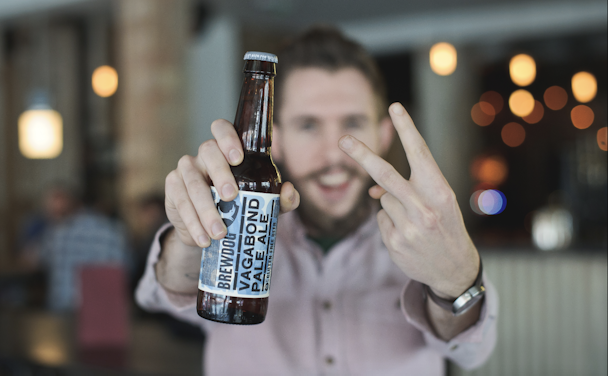
BrewDog has fallen out of favor with many fans after a number of blunders / Image via BrewDog
Why is BrewDog Controversial?
In its early days, BrewDog’s laddish humor and disruptive marketing won the brand plaudits with the industry and fans alike, yet an increasing number of blunders and scandals has seen the indie brewer slowly fall from grace, from transphobic ads to falling out with the UK’s alcohol trade group, accusations of plagiarism and advertising standards rulings.
Here, The Drum takes a look at some of the highs and lows that have shaped the BrewDog brand.
2008: BrewDog launches with a bang
BrewDog’s launch wins respect from the masses. It lands a variety of accolades including gold at the 2008 World Beer Cup and the Tenon Entrepreneur of the Year Award for demonstrating ‘exceptional vision and leadership’ at the 2008 National Business Awards for Scotland.
It quickly secures a deal with Tesco to stock several of its beers.
Hinting at what we can expect from the brand’s ’punk’ personality, it calls for the Portman Group – the long-reigning UK body that promotes sensible drinking – to be scrapped, saying it is impeding the development of small brewing companies.
Advertisement
2009: Drinks industry watchdog intervenes
The brewer begins to stack up a number of disagreements with the Portman Group. In 2009 it is condemned as ‘grossly irresponsible’ for calling one of its products Speedball – the name given to the combination of heroin and crack cocaine. It will be the first of many pieces of criticism over its product names.
The same year, its Tokyo beer is removed from shelves for breaking the code set for minimum mandatory standards for drinks marketing.
The Portman Group also spends months investigating complaints made about the naming of BrewDog’s Riptide, Punk IPA and Hoprocker beers – although it rules these would not require packaging changes.
2010: BrewDog releases beer in taxidermied animals
The brand opens the doors to its first BrewDog pub, in Aberdeen. Despite criticisms, its Hardcore IPA wins Gold at the 2010 World Beer Cup in the Imperial IPA category.

However, tensions continue between BrewDog and the Portman Group and the brand issues a ‘formal apology’ after an independent complaints panel found it encouraged anti-social behavior and binge drinking with its Dead Pony Club ale advertising.
Later, however, it expresses ”indifference and nonchalance” at the ruling, going on to attack double standards in the industry, which it says protect ”gigantic faceless brands” and stymie ”creativity and competition.”
BrewDog also falls out of favor with animal welfare activists after a stunt saw 12 bottles of its 55% The End Of History ale packaged inside the bodies of dead animals. At the time, animal rights organizations said that ”using shock tactics to get attention is terribly out of date, especially when this involves exploiting or degrading animals” and called the stunt “cheap marketing.”
2011: 'The world's smallest protest'
BrewDog is successful in its protests to change UK licensing laws after the coalition government agrees to review a 300-year old law that beer could only be served in third, half or full pint measures.
To illustrate its point, the brewer employs a person with dwarfism to stand outside parliament for a week holding a sign in what it called “the world’s smallest protest.”
Advertisement
2013: BrewDog rapped by advertising standards body
BrewDog is cautioned against causing ‘serious offence’ in future after falling foul of the Advertising Standards Authority.
The watchdog had been called in to examine the firm’s website, which reveled in the use of foul language – notably ‘motherfucker,’ ‘tits’ and ‘bastards’ – after one internet user challenged whether this was likely to cause offence.
In response to the investigation, co-founder James Watt said: “We actually just took down the statement on our website to make room for the equity for punks stuff. Soon, we will be putting the statement back on our website.
“We believe in freedom of speech and artistic expression. We don’t believe in mindless censorship. As for the ASA – those motherfuckers don’t have any jurisdiction over us anyway.”
2014: BrewDog takes aim at Russia
BrewDog launches a protest campaign at Russia’s ban on ‘homosexual propaganda’ ahead of the Winter Olympics with a new beer called Hello My Name is Vladimir.
The ‘not for gays’ product’s packaging features pictures of Vladimir Putin on a Warhol-style multi-colored background.
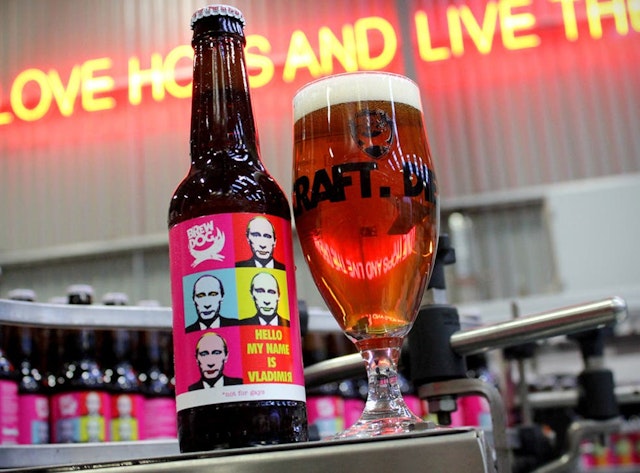
2015: BrewDog owners face transphobia criticism
8,000 people sign a petition against the brewer’s ’Don’t Make Us Do This... Equity for Punks’ funding ad, which is called out for being transphobic for featuring a skit of founders, James Watt and Martin Dickie, posing in drag in a red-light district setting.
The ad is labelled as “offensive caricatures of people, many of whom already suffer discrimination every day [such as] homeless people, trans women and sex workers” and BrewDog is encouraged to donate the proceeds earned to relevant charities that work to support the communities it ridiculed.
Watt issues a statement to The Drum saying: “The video we created was to launch the CrowdCube aspect of Equity for Punks and was made in the spirit of fun and sending ourselves up – it’s a shame that some people have taken offence where none was intended.“
It refers back to its Winter Olympics launch as an example of it campaigning for the LGBTQ+ community.
Suggested newsletters for you
2017: BrewDog vs Lone Wolf
BrewDog enters into a lengthy legal tussle with the estate of the late Elvis Presley after it argued its Elvis Juice beer could not be registered as a trademark on account that people may believe the concoction is endorsed by the estate.
The brewer launches its vodka brand, Lone Wolf, and sparks allegations of bullying and hypocrisy from the brewing community after it emerges it threatened legal action against a pub in Birmingham that opened under the same name.
Brother and sister owners Joshua and Sallie McFadyen say they chose the name in 2015, long before BrewDog launched its spirits brand, but decide not to fight against the brand for fears of financial repercussions.
2018: Pink IPA launch sparks derision
The feud between BrewDog and the Portman Group peaks when the brand’s release for International Women’s Day, the Pink IPA, was found to appeal to children.
There is further division over the product launch, which BrewDog claims is intended to be a ”send-up of the lazy marketing efforts targeting the female market,” but that many feel is a lazy stunt perpetuating sexism and poor-taste irony.
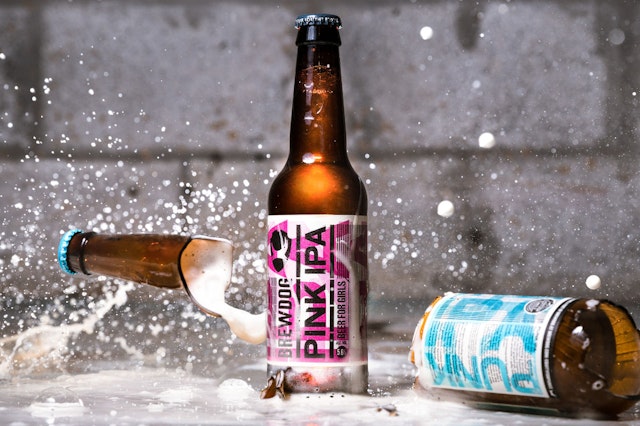
2019: Non-alcoholic IPA Punk AF launches
In 2019 the ASA launches an investigation into BrewDog after a number of complaints about an ad for its non-alcoholic IPA – Punk AF – which reads ‘Sober as a Motherfu,’ cutting off two letters to eliminate but allude to the swear word.
Just one day after it is revealed, the UK’s advertising watchdog confirms to The Drum that it has received 14 complaints challenging whether it was likely to cause serious or widespread harm.
A further 10 complainants also challenge whether the ad was inappropriate for display in a medium where it could be seen by children, sparking a formal investigation.
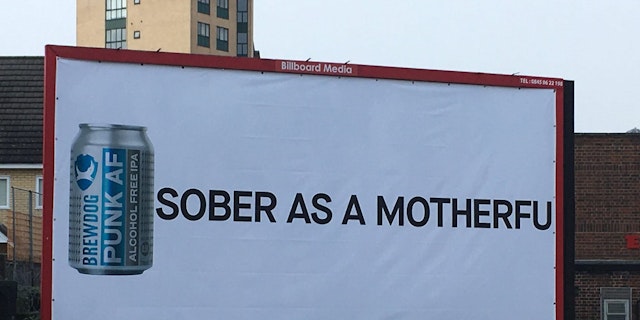
BrewDog and its former agency clash over the launch of the alcohol-free beer, with Manifest founder Alex Myers claiming his team created the ‘Punk AF’ brand during its nine-year relationship with BrewDog and was told the idea had been rejected, only to see it resurface.
Myers claims his agency had created the concept and had not been credited or paid for it.
2020: Hard seltzer health claims put to the test
A further ASA breach lands the brand in hot water after its ads are banned for claiming the brewer‘s hard seltzer line was ‘healthy.’
The ad, which appears in a paid-for Instagram post in January, reads, ’Due to advertising regulations we cannot claim this drink is healthy,’ above text that claims: ’Even though Clean & Press is only 90 calories per can, with no carbs or sugar and a little bit of alcohol, this is not a health drink. If you are looking for a health drink, do not drink Clean & Press.’
The watchdog takes issue with the implication that an alcoholic drink held health benefits, since it suggested the product was a low-sugar and low-carbohydrate alternative. The ASA also says the phrase ’a little bit of alcohol’ misrepresented the product, which has 5% ABV – higher than some BrewDog ales.
2021: BrewDog CEO feels the wrath of staff
BrewDog is forced to apologize to a number of former employees who accuse the company and its co-founder James Watt of fostering a “culture of fear” in which workers were bullied and “treated like objects.”
In an open letter that was put out on Twitter, 61 former employees allege that the brand frequently cut corners on health and safety, espoused values it did not live by and created a “toxic” culture that left staff suffering from mental illness.
“Growth, at all costs, has always been perceived as the number one focus for the company,” the letter alleges. “Being treated like a human being was sadly not always a given for those working at BrewDog.”
An open letter, to BrewDog. pic.twitter.com/xEd3B83qot
— Punks With Purpose (@PunksWPurpose) June 9, 2021
2022: BrewDog turns its focus to mental health
The beer brand is found to be in breach of US federal law after it sent multiple shipments containing beer with ingredients that had not been legally approved.
Staff at its Ellon brewery tell the BBC they were put under pressure in 2016 and 2017 to deliver the shipment, which resulted in a US-based importer saying they had been deceived by BrewDog.
BrewDog’s latest campaign is also met with a frosty reception. Following accusations of perpetuating toxic corporate culture, it partners with the online movement #IAmWhole in a bid to spark conversations around mental health issues.
The campaign with Rizzle Kicks’s Jordan Stephens aims to encourage people to unbottle their feelings and open up about anxiety and depression, and coincides with the launch of its Sad AF beer.
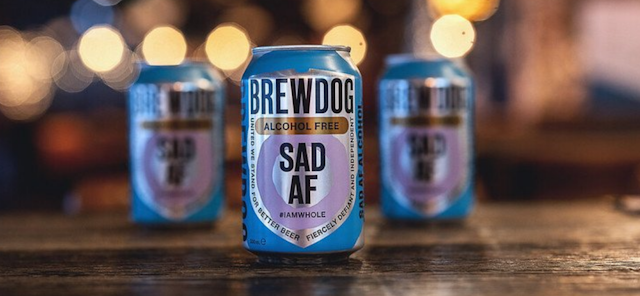
2022: BrewDog loses B-corp status
The brand lost its place on the B-corp list two years after joining the scheme, which offers certification of a company’s ethical commitment to the environment, community and staff.
It was understood to have been the subject of an investigation by B-lab (the body that assesses companies’ B Corp status) following the BBC documentary Disclosure: The Truth About Brewdog, which scrutinized the brewer’s working culture.
2022: Ad pulled over ‘one of your five a day’ claim
An ad that claimed the brewer's fruit-flavored beers counted towards “one of your five a day” is pulled by the Advertising Standards Authority, which claims it is misleading.
ASA acknowledges that the subject heading ‘one of your five a day’ might be interpreted by some consumers as a humorous nod to the fruit-flavored beers featured in the body of the email. “However, because the claim referred to well-known government advice on health and wellbeing, we considered that, in general, consumers would not expect advertisers to include such claims unless the advertised product was recognized as meeting the requirements of that advice,” it says.
A spokesperson from BrewDog responds to the ban, saying: “We respect the ASA’s decision and are happy to confirm that beer is not a fruit or a vegetable.”
2023: Solid gold scandal
BrewDog boss James Watt has to pay out almost £500,000 to winners of the company’s “solid gold“ beer can promotion that was dubbed misleading by the ASA.
The promotion, which went live in 2021, offered people the chance to find a solid gold can hidden in cases. However, some winners questioned the worth of the cans and complained after discovering they were gold-plated.
Watt says he “falsely thought“ the cans were made from solid gold having “misunderstood“ the process of how they were made.

